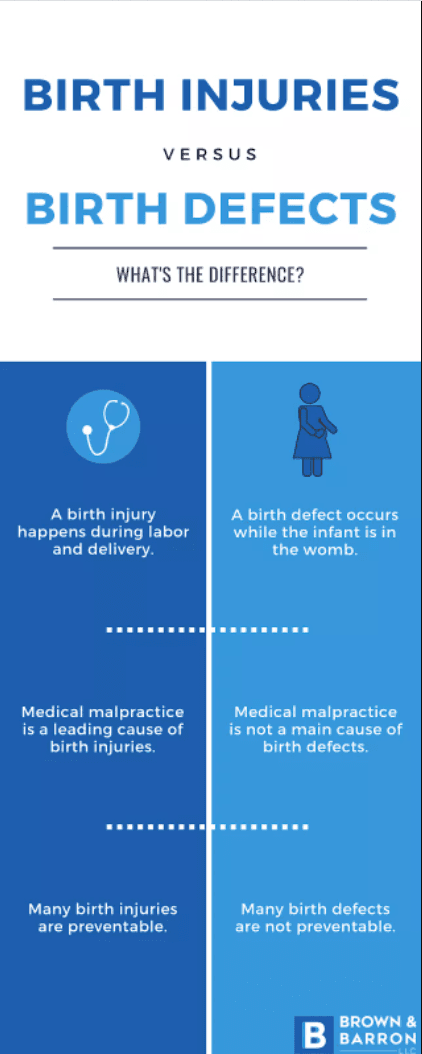

Birth Injuries

Baltimore Birth Injury Lawyer
Birth injuries can be incredibly devastating and traumatic for all involved, and they are generally the unfortunate result of medical malpractice. Our team of Baltimore birth injury lawyers is ready to fight for you! We are backed by decades of experience and provide personalized, tenacious representation.
As parents, you spend months planning the arrival of your child, anxious and hopeful for all of the wonders you hope your child will experience. Sadly, however, childbirth does not always go as smoothly as it should. When a child is injured before, during, or after childbirth, devastating injuries may occur.
Has your child suffered a birth injury due to medical malpractice? Call our birth injury lawyers in Baltimore at (410) 698-1717 or contact us online for a free case evaluation.



We Have Recovered Millions for Our Clients
If a child suffers at the hands of a medical professional’s negligence, the results can be catastrophic and permanent. Due to the vulnerable nature of a newborn baby or unborn fetus, birth injuries are tragically quite common when treatment and care is placed in the wrong hands.
If you are in need of an aggressive and determined Maryland medical malpractice lawyer to fight for all you, your child and your family have suffered, and will continue to suffer, look no further than Brown & Barron, LLC. We will treat your case with the urgency and thoroughness it deserves, and we will also bring you into our family to ensure your experience throughout the legal process is as easy and comfortable as possible.
Why Hire Brown & Barron, LLC?
- 130+ Years of Combined Experience
- Free, No-Obligation Consultations
- Millions Recovered for Our Clients
- Personalized & Tenacious Representation by a local, award-winning law firm specializing in complex medical cases like this
What Are Birth Injuries?
The term “birth injury” refers to any damage or injury your child sustains before, during, or immediately after delivery. Often, birth injuries are minor and are simply a physical side effect of being born.
Sometimes, however, birth injuries are more serious. In a legal sense, birth injuries refer to any profound injury or death to the infant or mother that can be attributed to medical mistakes, malpractice, negligence, or flawed hospital policy during the birthing process.
Brain Injuries
There are a number of brain injuries that can occur, and the baby may suffer long-term damages as a result. Most of the time, brain injuries are caused by oxygen deprivation.
Typically, these situations are labeled as:
- Anoxia: Anoxia refers to a severe form of oxygen deprivation, where there's a complete lack of oxygen flow to the baby for a significant period.
- Hypoxia: Hypoxia is a condition characterized by reduced oxygen supply to tissues, which can occur during childbirth when there's an insufficient amount of oxygen reaching the baby's organs. It's less severe than anoxia but can still lead to complications and potential damage if prolonged.
- Birth Asphyxia: Birth asphyxia specifically refers to a condition where the baby experiences a lack of oxygen and blood flow during childbirth, leading to difficulty in breathing or inadequate oxygen supply. It's often diagnosed when a newborn shows signs of respiratory distress, low heart rate, and poor muscle tone immediately after birth due to oxygen deprivation during labor.
- Perinatal Asphyxia: Perinatal asphyxia encompasses oxygen deprivation that occurs around the time of birth, usually before, during, or immediately after delivery. It's a broader term that includesoxygen supply to the baby's tissues or organs. It can lead to cell damage or death if not promptly addressed. Anoxia can occur during childbirth if there's a complete interruption of both birth asphyxia and conditions where oxygen deprivation happens shortly before or after birth. Perinatal asphyxia can lead to various complications, including brain damage and organ dysfunction, if not promptly addressed.
The most common brain-related birth injuries are cerebral palsy and hypoxic ischemic encephalopathy (HIE). Most brain injuries during pregnancy are caused by failure to monitor, failure to identify prolapsed umbilical cord, or failure to use tools correctly when assisting with birth.
Cerebral palsy affects nearly 800,000 children and can be a result of maternal infections, infant infection, infant stroke, and a lack of oxygen. In some situations, though, proper monitoring by the medical experts can allow for preventative measures when it comes to cerebral palsy.
Muscle and Physical Injuries
Typically occurring during the delivery process, there are multiple different muscle-related injuries that can be sustained, and the baby may be left to suffer.
These are the common physical and muscle-related injuries that can occur:
- Brachial plexus injury: The upper extremity of the arm is injured
- Erb’s palsy: The nerves of the upper arm are affected, causing loss of feeling or weakness.
- Klumpke’s palsy: The lower nerves in the arm are damaged.
- Shoulder dystocia: An injury to the baby’s head and shoulder when trapped behind the pelvic bone during delivery.
Delivery Injuries
Some of the injuries that can be caused by misuse of forceps or vacuum extractor include broken bones, lacerations, and skull fractures. These are often dependent on how the physician handles the delivery, and whether or not they monitor the situation properly for the best standard of care.

Birth Injuries vs. Birth Defects
There are several differences between birth injuries and birth defects that expectant parents should understand.
While the terms “birth injury” and “birth defect” are sometimes used interchangeably, there is an important difference between the two.
A birth defect is a condition that forms during a mother’s pregnancy, before the baby is born, and is in no way caused by the baby’s or the mother’s medical care.
Instead, the condition often arises due to genetics. However, a birth injury occurs when there is physical harm done to the baby during the labor or delivery process.


Hear from Our Clients
Over 150 5-Star Reviews from Our Past Clients
-
"Brown & Barron, LLC has to be one of the best law firms in the state of Maryland"
Brown & Barron, LLC has to be one of the best law firms in the state of Maryland, possibly the entire country. The quality of their service is second to none. They go above and beyond to serve their clients and get the job done.
- Eric B. -
"Exceeded All Expectations"
The best professional experience I have ever been a part of. I trusted them the entire way, and they exceeded all expectations.
- Darius L. -
"I would recommend Brown & Barron to anyone who needs a lawyer for a medical malpractice case."
Brown & Barron provided efficient, straight-up, and straightforward services in my medical malpractice case. They answered all my questions and kept me informed every step of the way.
- D.D. -
"Working with this law firm gave me confidence and comfort during an emotional and difficult time."
After a two-year process, my case is resolved. I would like to commend and highly recommend Mr. Chris Casciano for his diligence, attention to detail, and support for myself and my family.
- A.L.
-
 About Brown & Barron
About Brown & Barron![]()
-
 Experienced Legal Team
Experienced Legal Team![]()
-
 Focused on Your Recovery
Focused on Your Recovery![]()
-
 Committed to Your Rights
Committed to Your Rights![]()



